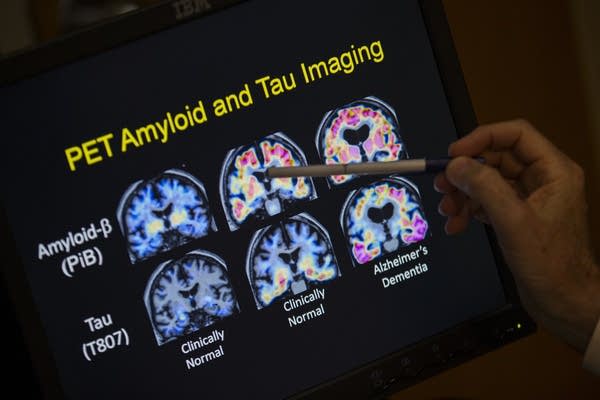Questions raised surrounding images connected to U of M Alzheimer's research

Go Deeper.
Create an account or log in to save stories.
Like this?
Thanks for liking this story! We have added it to a list of your favorite stories.
Scientists and researchers all over the world are looking at the University of Minnesota, and this time not for good reasons. A recent article published in the journal Science questions discoveries made at the U of M that have been fundamental to Alzheimer's research.

At the heart of the investigation are a series of images in a key study that have been allegedly falsified. MPR News host Cathy Wurzer spoke to the article's author, Charles Piller, on Morning Edition on Thursday.
The following is a transcript of the conversation, edited for clarity. Listen to the full conversation using the audio player above.
Can you briefly explain the allegations that are being made?
Well, according to analysis by a neuroscientist at Vanderbilt University by the name of Matthew Schrag who looked at dozens of papers, written by Sylvain Lesné, a very highly acclaimed professor there —what Schrag found was a troubling series of apparently doctored images, images that appeared to have been manipulated, so that they were not the accurate representation of data as described in the papers.
Turn Up Your Support
MPR News helps you turn down the noise and build shared understanding. Turn up your support for this public resource and keep trusted journalism accessible to all.
So one of these papers was very important. It has been cited 1000s of times by other scholars and is thought to be one of the more influential papers in the field of Alzheimer's in this entire 21st century.
Does that mean that all of the research at the University of Minnesota would be called into question?
No, I don't think that would be an appropriate conclusion to reach. What I will say is that now that it's clear, it means that anything that's followed from it that depended on those results, for other research that credited that work as being fundamental to understanding in the field, all of those things should be looked at again. It should require a very strong evaluation.
How much of a black eye does the University of Minnesota have at this point?
I think this is very troubling for the university, in part because of the stature of Karen Ashe and the fact that this came out of her lab. I don't know what the degree of scrutiny they're giving to this because the university doesn't talk about these sorts of investigations when they're in process. They're looking into it.
I think most scientists believe that when the record is tainted by possibly faked data, it's super important to go back and correct that record, not just for the sake of accuracy in the record, but because scientists stand on the shoulders of their predecessors. They depend on the accuracy of work that's been done before them.
And if that work is suspect, and the records not thoroughly corrected, including retractions or they might be warranted, then you have continued pollution of the record, a continued tainting of ideas associated with this that could indeed slow down or possibly just distort the way in which scientists go after this super important problem of curing Alzheimer's.
Before you go, by the way, what happened to the researcher?
I have no information about any personnel issue associated with Lesné. I do know the university has stated publicly that they're looking into his work. I think one of the key things for listeners to think about is how fast will this investigation go. The university has been provided with an enormous amount of information, in incredible detail and context, the apparent degree of possible manipulations of data by Lesné. And I think they have a good start on this as a result of it.
Often when these things happen — not just the University of Minnesota — but many universities seem to take months or even years to do their evaluation. And I think ethicists and others who closely track these kinds of problems, feel that that in itself can be a problem. It allows the problems that emerge to be distant in the public memory before any action is taken. And I would just say it would be very interesting to see how quickly and how aggressively the university moves on correcting this gigantic question in its midst.
We reached out to the University of Minnesota. Professor Karen Ashe sent an email response writing, “Having worked for decades to understand the cause of Alzheimer's disease so that better treatments can be found for patients. It's devastating to discover that a co-worker may have misled me and the scientific community through the doctoring of images. It is, however, additionally distressing to find that a major scientific journal has frequently misrepresented the implications of my work.” The University of Minnesota said it's reviewing the questions any claims have raised.


